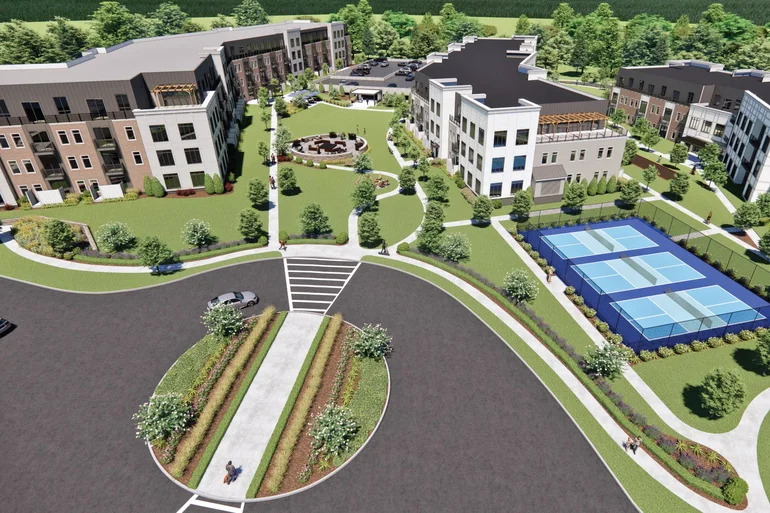
CEO’s Journey from Addiction Treatment to Community Development Reflects Values-Driven Approach to Building Healthier Spaces
The CEO of Lake Ave Recovery and Creative Addiction Recovery Estates (CARE, Inc.), Jack Maroney, MSHCA, LADC1, is helping to open Worcester’s newest affordable apartment development, bringing the same community-focused approach that drives addiction treatment work to a 491-unit housing project that just received final city approvals.
The 491-unit market rate apartment development, which received final city approvals this summer after navigating through Worcester’s Planning Board, Zoning Board of Appeals, and Conservation Commission, represents more than just another housing project – it’s an opportunity to create the kind of community infrastructure that supports long-term wellness and stability.
The Recovery-Community Connection
“When you’ve walked the path of recovery yourself, you understand that environment matters,” explains CEO, Jack Maroney, MSHCA, LADC1, whose dual leadership of Lake Ave Recovery and CARE, Inc. has given him unique insight into what makes communities thrive.
“Recovery isn’t just about individual transformation, it’s about creating systems and spaces that support sustained wellness for everyone.”
This philosophy is evident in how the Grafton Woods project has been approached. Rather than simply maximizing density or profit, the development prioritizes community-building features that research shows support mental health and social connection: open common areas, recreational spaces including pickleball courts, and thoughtful integration with the existing neighborhood.
Beyond Traditional Treatment Models
The traditional addiction treatment industry often focuses solely on clinical interventions, but leaders with lived experience understand that lasting recovery requires comprehensive community support. This broader perspective naturally extends to how such leaders approach other ventures, including real estate development.
“You start to see everything through the lens of: ‘Does this create conditions where people can flourish?'” Maroney notes.
“Whether that’s in our treatment programs or in the communities we help build, the underlying values are the same – dignity, connection, and opportunity for growth.”
The Grafton Woods development, planned for a 17.7-acre site off Grafton Street that Brandt Lane Development purchased for $4.3 million in 2023, exemplifies this approach. The five four-story buildings are designed not just as housing units, but as components of a community ecosystem that includes 793 parking spaces, green space, and recreational amenities.
Values-Driven Development
The principles that guide effective addiction recovery – accountability, community connection, long-term thinking, and environmental design – translate well to community development. Both require understanding that sustainable change happens through systems, not just individual efforts.
“In recovery, we learn that you can’t just treat the symptom. You have to address the whole person and their environment,” Maroney explains. “The same is true for community development. You can’t just build housing; you have to think about how those homes fit into the larger ecosystem of a neighborhood.”
This perspective has influenced everything from the project’s approach to environmental remediation (the site currently contains waste materials that will be cleaned up as part of construction) to the decision to rebuild Brandt Lane as part of the development process.
The Ripple Effect
For professionals who have experienced recovery, success in one area often amplifies impact in others. The skills developed in building Lake Ave Recovery and CARE, Inc.—understanding human needs, creating supportive systems, and maintaining long-term vision despite short-term challenges—directly inform approaches to community development.
The Grafton Woods project represents this ripple effect in action. While the development will provide nearly 500 new luxury apartments for Worcester’s east side, its deeper value may lie in demonstrating how leaders shaped by recovery experiences bring different priorities to community building.
Moving Forward
As Grafton Woods moves toward construction following its August approvals, the project stands as an example of how personal transformation experiences can inform broader community impact. While the exact construction timeline hasn’t been announced, the development’s approval process demonstrates the kind of thorough, community-focused approach that recovery-informed leadership brings to complex projects.
For Jack, the connection between his work in addiction treatment and community development isn’t coincidental, it’s intentional. Both represent investments in creating conditions where people can build stable, meaningful lives.
“At the end of the day, whether we’re talking about recovery or community development, we’re talking about the same thing,” he concludes. “How do we create environments where people can be their best selves and support each other in that process? Everything else flows from there.”
The Grafton Woods project, with its emphasis on community amenities and thoughtful integration into the existing neighborhood, suggests that when leaders bring recovery values to community development, the results benefit everyone—not just those directly involved in treatment services.
As Worcester prepares to welcome this new addition to its housing stock, the development serves as a model for how personal transformation experiences can inform broader community impact, creating ripple effects that extend far beyond any single project or program.
Learn more about the Grafton Woods Project: https://www.wbjournal.com/article/grafton-streets-491-unit-luxury-apartment-complex-moving-forward-after-city-approvals
Learn more about Lake Ave Recovery: https://www.lakeaverecovery.com/
